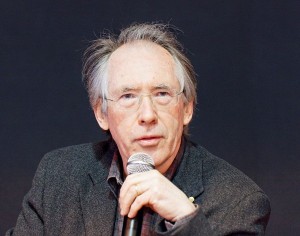Biography

Ian McEwan was born in 1948 in Aldershot, England. His father was an officer in the British Army and McEwan spent his early childhood in various places throughout the world, including Libya and Singapore. He received his B.A. in English from the University of Sussex and an M.A. in creative writing from the University of East Anglia, where he studied with novelist Malcolm Bradbury (Slay 2). McEwan had led and continues to lead a highly prolific career. McEwan’s writing has frequently been honored. He has won the Somerset Maugham Award (for First Love, Last Rites), the Evening Standard Award for best screenplay (for The Ploughman’s Lunch), the Whitbread Award (for The Child in Time). He has been nominated for the Booker Prize six times and won it for Amsterdam in 1998. In 2011 he was awarded the Jerusalem Prize.
Themes
Over the course of his career, McEwan has explored a variety of ideas and themes. His early work exhibits an interest in the macabre, in violence, and in human perversity. These works are written in a realistic style in order to convey a sense of ordinariness (Slay 8). McEwan said of his interest in violence: “I don’t think I’m particularly obsessed with violence, but at the same time I am very disturbed by it. I suppose many of the things that disturb me find their way into my fiction” (qtd. in Authors). While continuing to examine humanity’s capacity for cruelty and violence, McEwan broadened his outlook and began to address other issues. Many of his novels explore the idea of childhood. He also demonstrates an interest in the moral bankruptcy of politics and the potential dangers of “conservative extremism” (Slay 116).
An excellent example of McEwan’s use of both of these themes is The Child In Time. Published in 1987, The Child In Time is set in a very near future. McEwan creates a highly subtle dystopia where the conservative trends of Thatcher’s Britain are extended one degree further. The differences between this futuristic world and the present are small but telling. For example, beggars must use government-issued bowls and badges, and lack of care for the environment has caused pollution to alter the climate. McEwan believes, however, that Amsterdam signals a new beginning in his career. He told Bold Type magazine that Amsterdam “is quite distinct from my novels written over the last ten-year period, which I think all belong together, beginning with The Child in Time and really ending with Enduring Love: novels of a sort of crisis and transformation, rites of passage of great intensity for characters.”
Works Cited
- “An Interview With Ian McEwan.” Bold Type. 27 March 1999. Web. <
http://www.boldtype.com/1298/mcewan/interview.html> No longer available online. - Contemporary Authors. “Ian (Russell) McEwan.” Gale Research Group: 1999. Web.
- Slay, Jack. Ian McEwan. New York: Twayne, 1996.
Selected Works by Ian McEwan
- McEwan, Ian. Amsterdam. New York: Doubleday, 1998.
- —. Atonement. New York: Nan A. Talese, 2002.
- —. Black Dogs. London: Jonathan Cape, 1992.
- —. The Cement Garden. 1978. New York: Penguin Books, 1988.
- —. The Child in Time. New York: Penguin Books, 1988.
- —. The Children Act. New York: Nan A. Talese/Doubleday, 2014.
- —. The Comfort of Strangers. New York: Penguin Books, 1989.
- —. Enduring Love. London: Jonathan Cape, 1997.
- —. First Love, Last Rites. New York: Penguin Books, 1989.
- —. The Imitation Game and Other Plays. Boston: Houghton Mifflin Co., 1982.
- —. In Between the Sheets. New York: Penguin Books, 1990.
- —. The Innocent. London: Cape, 1990.
- —. Nutshell. New York: Nan A. Talese/Doubleday, 2016.
- —. On Chesil Beach. New York: Nan A. Talese/Doubleday, 2007.
- —. Saturday. New York: Nan A. Talese, 2005.
- —. Solar. New York: Nan A. Talese/Doubleday, 2010.
- —. Sweet Tooth. Nan A. Talese/Doubleday, 2012.
Screenplays
- —. The Good Son. Twentieth-Century Fox, 1993.
- —. The Ploughman’s Lunch. London: Methuen, 1985.
- —. Sour Sweet. London: Faber, 1988.
Related Links
Salon’s interview with McEwan
http://www.salon.com/2005/04/09/mcewan_5/
Author: Robert Hunt, Spring 1999
Last edited: May 2017